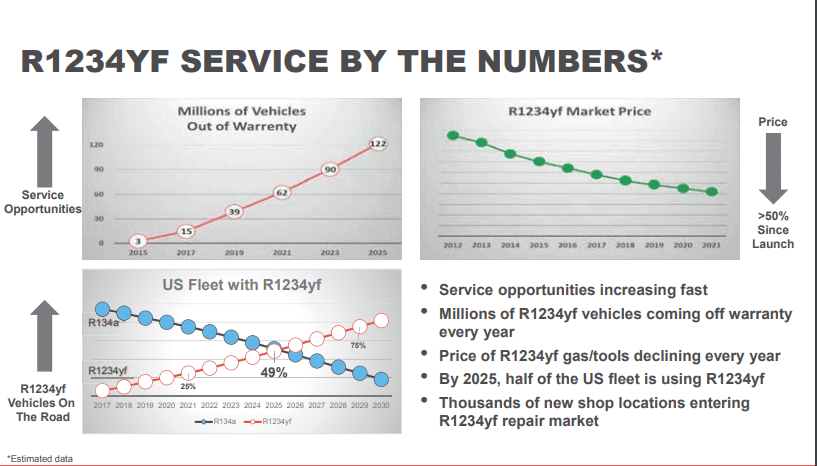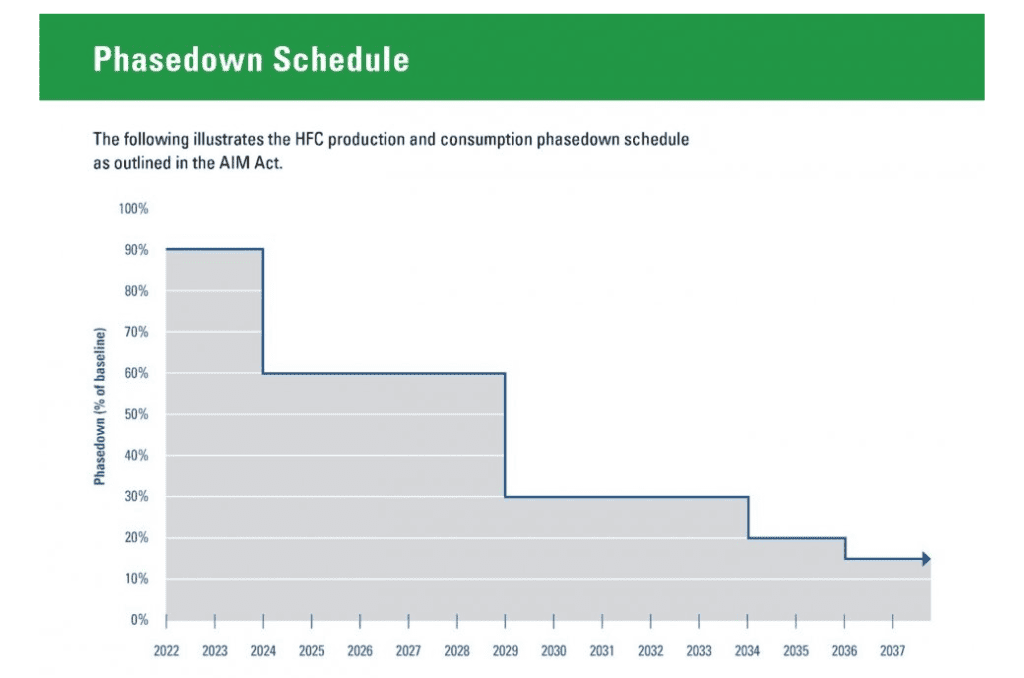Refrigerant Deja Vu (Part Deux)
By Richard Hawkins, MACS Technical Contributor
This is the second of two articles about the transition from R-134a to R-1234yf refrigerant. Part 1: Refrigerant Deja Vu – May 8th
The previous article ended with the following: R-1234yf vehicles have been present in the US market now for over 10 years. The transition from R-134a to R-1234yf is another monumental change which is taking place.
Continued…
Back in the early 1990s when R-134a was introduced, the OEM dealers were initially the only shops equipped to service the systems. As vehicles started to come out of warranty, independent shops started acquiring the necessary equipment to service R-134a systems. Slowly but surely the percentage of R-134a work increased and the number of shops doing R-134a work increased along with it. Along the way, there was a time when the percentages of R-12 and R-134a work were equal. As more R-134a equipped vehicles were produced, vehicles with R-12 were taken out of service. As R-12 systems were retrofitted to R-134a, the percentage of R-12 work declined. This continued until one day it seemed like doing R-12 work was almost a thing of the past.
The same sort of thing is occurring with the transition to R-1234yf, but we are still in the initial stages of it. Honeywell did a presentation at the 2021 MACS Training Event and Trade Show which contained interesting graphs. These graphs contained information on the percentage of vehicles with R-134a and R-1234yf systems and how that is changing. Please see figure #1.

Photo credit – Honeywell.
The graph titled US Fleet with R-1234yf indicates the percentage of R-1234yf vehicles in the US fleet in 2023 at about 30% to 35%. That does not necessarily translate to the percentage of work on R-1234yf vehicles being the same. However, it does mean that with the number of R-1234yf vehicles shown out of warranty and growing fast, the percentage of R-1234yf work is only going to increase.
Asking the Helpline
To get an idea of where we currently are, I contacted a couple of A/C tech lines and posed the following question:
What percentage of the tech calls you are currently managing would you estimate involve R-1234yf systems?
The answers were in the 20% to 25% range.
Going a step further, I also asked what some of the more frequent questions were that came up related to R-1234yf systems. Those questions were:
Can I use the same oil with R-134a and R-1234yf?
The answer to that is that R-134a oil cannot be used with R-1234yf because it lacks an acid reducing additive that R-1234yf oils contain. However, most R-1234yf oils can be used with R-134a.
Sometimes I will order a compressor for an R-1234yf vehicle and when I take the compressor out of the box, it says for use with R-134a, but there is no mention of R-1234yf.
Are R-134a compressors compatible with R-1234yf?
The answer to that question is that the compressor itself is compatible with R-1234yf. However, if it is shipped containing oil, then the oil must be drained and replaced with R-1234yf compatible oil.
Are there retrofit kits available to convert R-1234yf system to R-134a?
The answer to that is no. In fact, it is illegal to put R-134a in a R-1234yf system.
I have also talked to shops who specialize in A/C. Some were reporting that the percentage of work they were doing on R-1234yf systems is about 20% to 25% of their total A/C work volume.
Another factor that is part of the transition from R-134a to R-1234yf is a Phasedown schedule. Please see figure #2.

Unlike the production of R-12 (for US consumption) coming to a complete halt at the end of 1995, there currently is not a date mandated to produce R-134a to be stopped.
There are increased shops doing R-1234yf work each year. The number will no doubt continue to increase as time goes on. Each shop will need to do their due diligence and determine when the time is right from them to begin servicing R-1234yf systems.

Leave a Reply